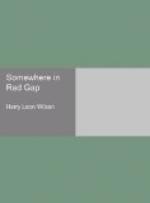“Well, that’s all. Of course these cops when they come up said the two men was desperate crooks wanted in every state in the Union; but I swore I knew them both well and they was harmless; and I made it right with ’em about the reward as soon as I got back to a check book. After that they’d have believed anything I said. And I sent something over to the Blackhanders that had turned out to help look, and something to Conductor Number Twenty-seven. And the next day I squared myself with Mrs. W.B. Hemingway and her husband, and Mrs. L.H. Cummins, when they come back, the aunt not having been sick but only eccentric again.
“And them two poor homeless boys—they kind of got me, I admit, after I’d questioned ’em awhile. So I coaxed ’em out here where they could lead the wild, free life. Kind of sad and pathetic, almost, they was. The fat one I found was just a kind of natural-born one—a feeb you understand—and the old one had a scar that the doctor said explained him all right—you must have noticed it up over his temple. It’s where his old man laid him out once, when he was a kid, with a stovelifter. It seemed to stop his works.
“Yes; they’re pretty good boys. Boogies was never bad but once, account of two custard pies off the kitchen window sill. I threatened him with his stepmother and he hid under the house for twenty-four hours. The other one is pretty good, too. This is only the second time I had to punish him for fooling with live ca’tridges. There! It’s sundown and he’s got on his Wild Wests again.”
Jimmie Time swaggered from the bunk house in his fearsome regalia. Under the awed observation of Boogles he wheeled, drew, and shot from the hip one who had cravenly sought to attack him from the rear.
“My, but he’s hostile!” murmured my hostess. “Ain’t he just the hostile little wretch?”
IV
ONCE A SCOTCHMAN, ALWAYS
Terrific sound waves beat upon the Arrowhead ranch house this night. At five o’clock a hundred and twenty Hereford calves had been torn from their anguished mothers for the first time and shut into a too adjacent feeding pen. Mothers and offspring, kept a hundred yards apart by two stout fences, unceasingly bawled their grief, a noble chorus of yearning and despair. The calves projected a high, full-throated barytone, with here and there a wailing tenor against the rumbling bass of their dams. And ever and again pealed distantly into the chorus the flute obbligato of an emotional coyote down on the flat. There was never a diminuendo. The fortissimo had been steadily maintained for three hours and would endure the night long, perhaps for two other nights.
At eight o’clock I sleepily wondered how I should sleep. And thus wondering, I marvelled at the indifference to the racket of my hostess, Mrs. Lysander John Pettengill. Through dinner and now as she read a San Francisco newspaper she had betrayed no consciousness of it. She read her paper and from time to time she chuckled.




